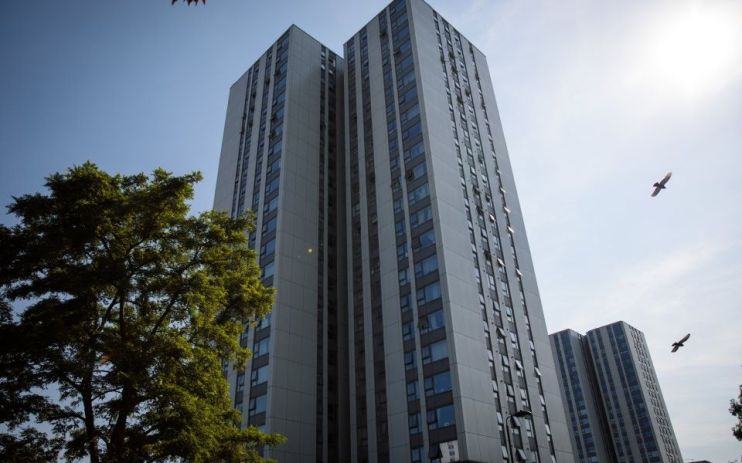‘You can’t catch a break’: Leaseholders face high insurance fees amid cost of living crisis

Leaseholders have said soaring building insurance fees amount to “daylight robbery,” amid the City watchdog’s probe of the market.
The Financial Conduct Authority (FCA) was asked to review the insurance market for blocks of flats earlier this year, after housing minister Micheal Gove said he was “extremely concerned” by accelerating costs faced by leaseholders.
In an update, the FCA said price increases could arise from insurers shying away from bidding for new business of multi-occupancy building or charging particularly high premiums to insure them,” due to perceptions around safety in the wake of the 2017 Grenfell Tower fire.
The financial regulator was also concerned harm was being caused by high commission paid to brokers and property managers, as well as “a lack of competitive pressure on prices.”
Rules to limit commission may be considered, if commission paid to brokers was found to be “a significant cause of harm to leaseholders,” a letter to the secretary of state said earlier this week.
Measures to be mulled could include a cap on the level of commission or banning certain practices, such as commissions based on a percentage of a premium.
One leaseholder in north-London, Joe Douglas, told CityA.M. he had seen a four-fold increase in insurance costs over the past four years. “It’s incredibly expensive,” he said.
Leaseholders were in a tough situation as they cannot “go and get alternative quotes easily, because it’s not your property,” he said.
“If you have a car insurance bill that doubled one year, you could go to another insurer and ask how much they would charge you and it’s competitive. You can’t do that in this situation,” he said.
With bills rising across the board, Douglas said it would be less well off households hit the hardest by costs associated with flats’ insurance rates.
“You can’t catch a break, it feels like there’s nobody looking out for you,” he added.
Leaseholder groups have been lobbying for more transparency and control. “Everyone’s making more money on the insurance side through higher premiums or higher commissions but leaseholders are losing out – they can’t challenge it as they have no rights,” Douglas said.
Echoing Douglas’ frustration, leaseholder Karryn Beaumont said the soaring fees amounted to “daylight robbery”.
Leaseholders at the New Providence Wharf development successfully requested a breakdown of charges to the broker and developer – with the developer appearing to take a huge chunk some years.
Information on how such fees are divided can be tricky to obtain. The FCA has said it is “considering whether leaseholders may benefit from enhanced information disclosure.”
Leaseholder Henry Grala said his flat complex has seen an increase in insurance costs of around 360 per cent since 2019.
Grala was among campaigners calling on authorities to consult with leaseholders more.
“Leaseholders are finding it very difficult to meet these costs,” Grala told CityA.M. “And not to mention their safety.”
Charities have called on the FCA to change its Insurance Conduct of Business Sourcebook (ICOBS) rules.
“At the moment, most leaseholders fall outside the FCA’s definition of policyholder and therefore do not have a right to full commission and remuneration data,” Harry Scoffin, of campaigning charity Leasehold Knowledge Partnership, explained.
“Even the FCA’s predecessor, the FSA, acknowledged that ICOBS would need to be tweaked to protect leasehold flat owners if it were to take action on this.”
“Also, the FCA is silent on low and no-claims bonuses to freeholder landlords, which often mean lessees are paying for policies they cannot even access in the event of damage to common parts, for example,” Scoffin added.
The British Insurance Brokers’ Association (BIBA) said the FCA’s most recent letter was the first it had heard of any potential limits on broker commission.
“However, in many instances the primary insurers look to the broker to do much of the work and incur much of the cost to enable cover to be placed – for example arranging surveys of the property and conducting detailed analysis to satisfy the insurer’s information requirements,” Graeme Trudgill, executive director of BIBA.
Brokers were “working harder than ever,” to place insurance, as primary insurers have reduced their exposure in tower blocks, Trudgill added.
The insurance and reinsurance premium was the main cost to the policyholder, the BIBA said. It was working with other parties to “look at solutions to provide more affordable property insurance premiums for high rise residential buildings that require remediation work from a fire safety perspective.”
The Association of British Insurers (ABI) said it was awaiting the FCA’s final report with “much interest”.
“Insurers recognise and sympathise with the challenges leaseholders are facing with increased buildings insurance costs. We have been working with the insurance industry, government and FCA to identify options to help leaseholders until the necessary remediation work has been completed,” James Dalton, ABI director of general insurance policy, said.